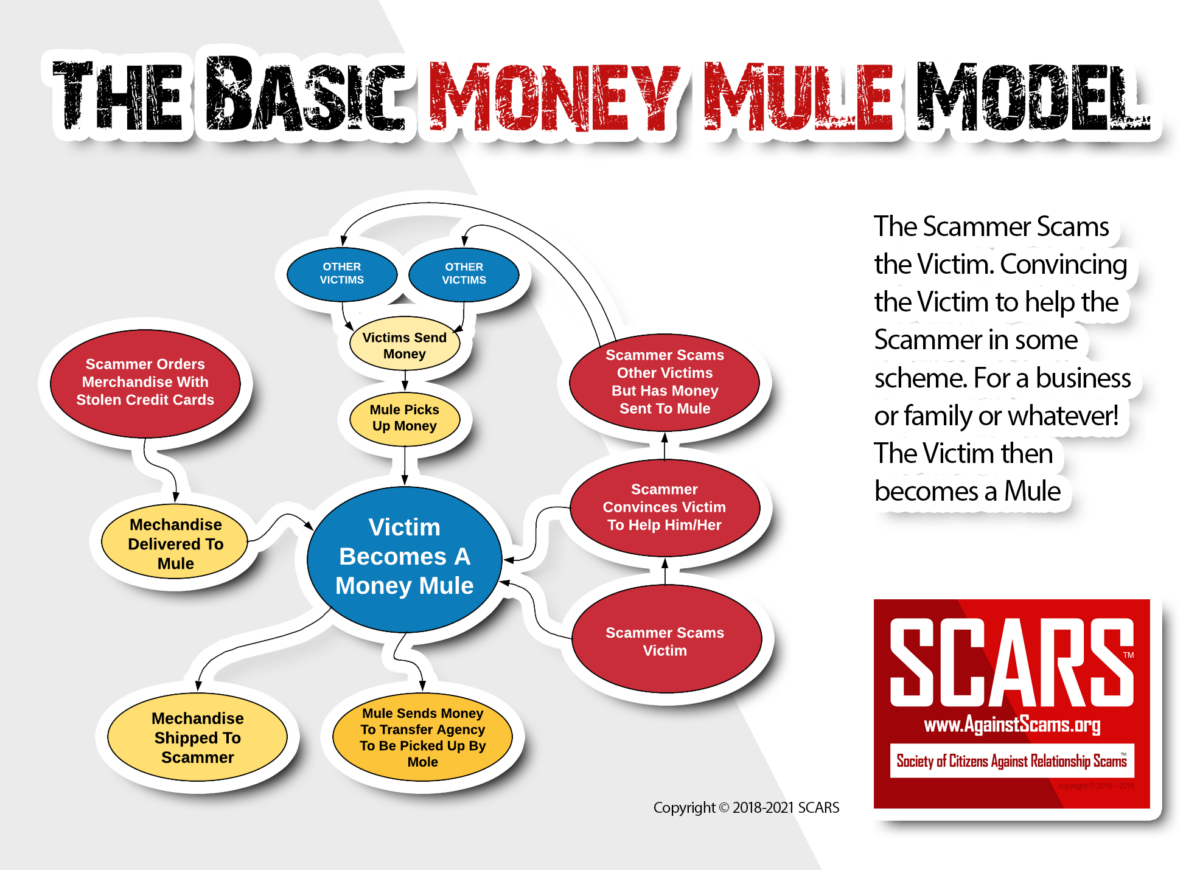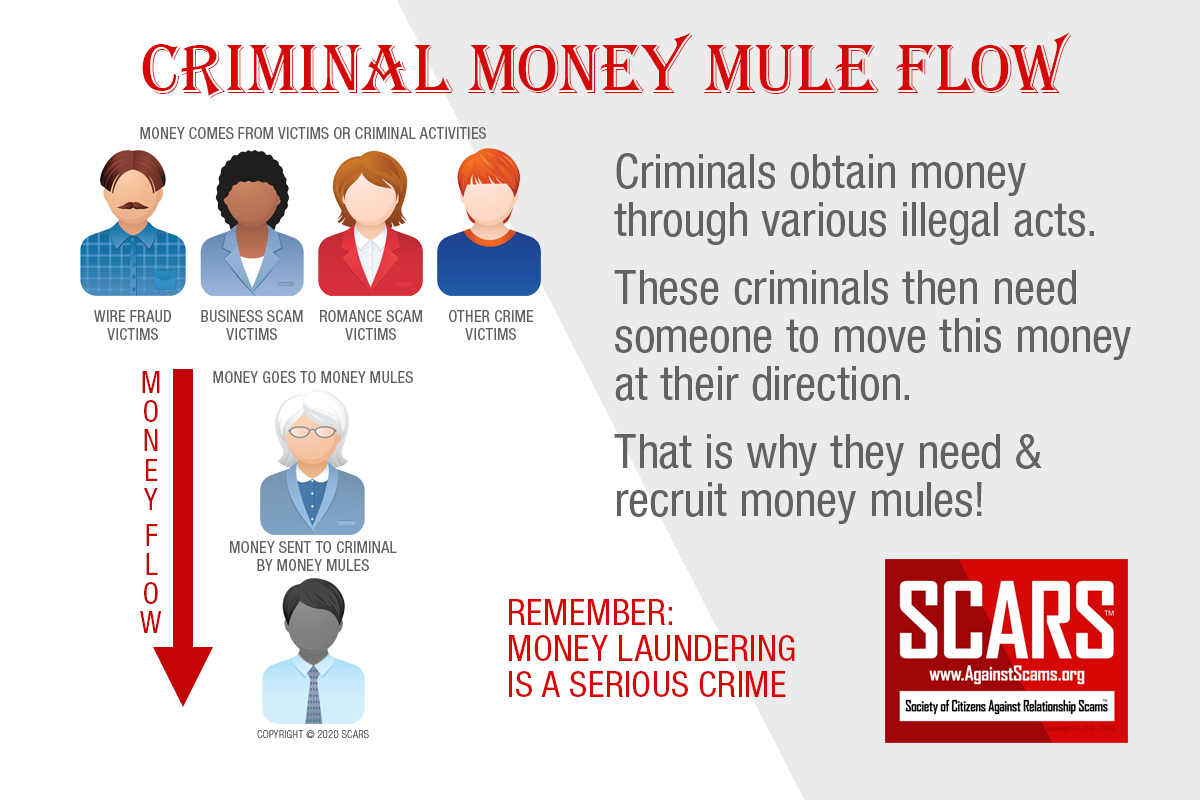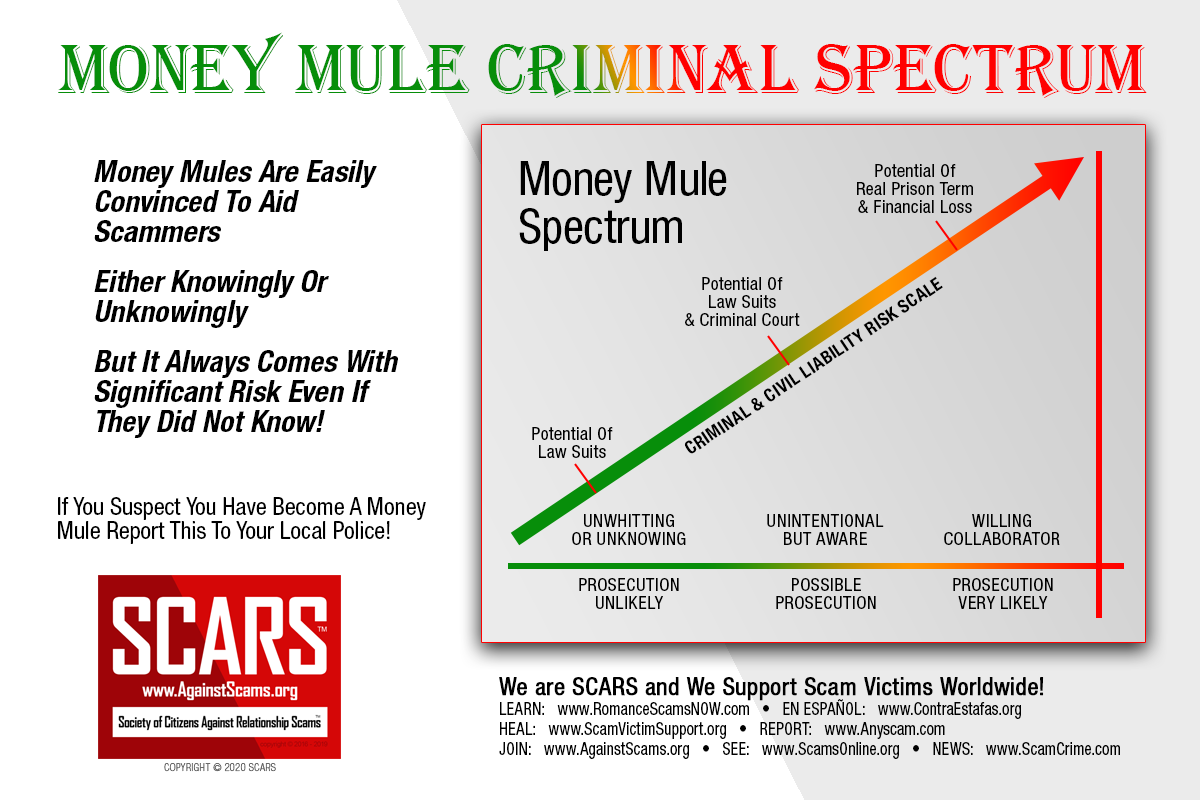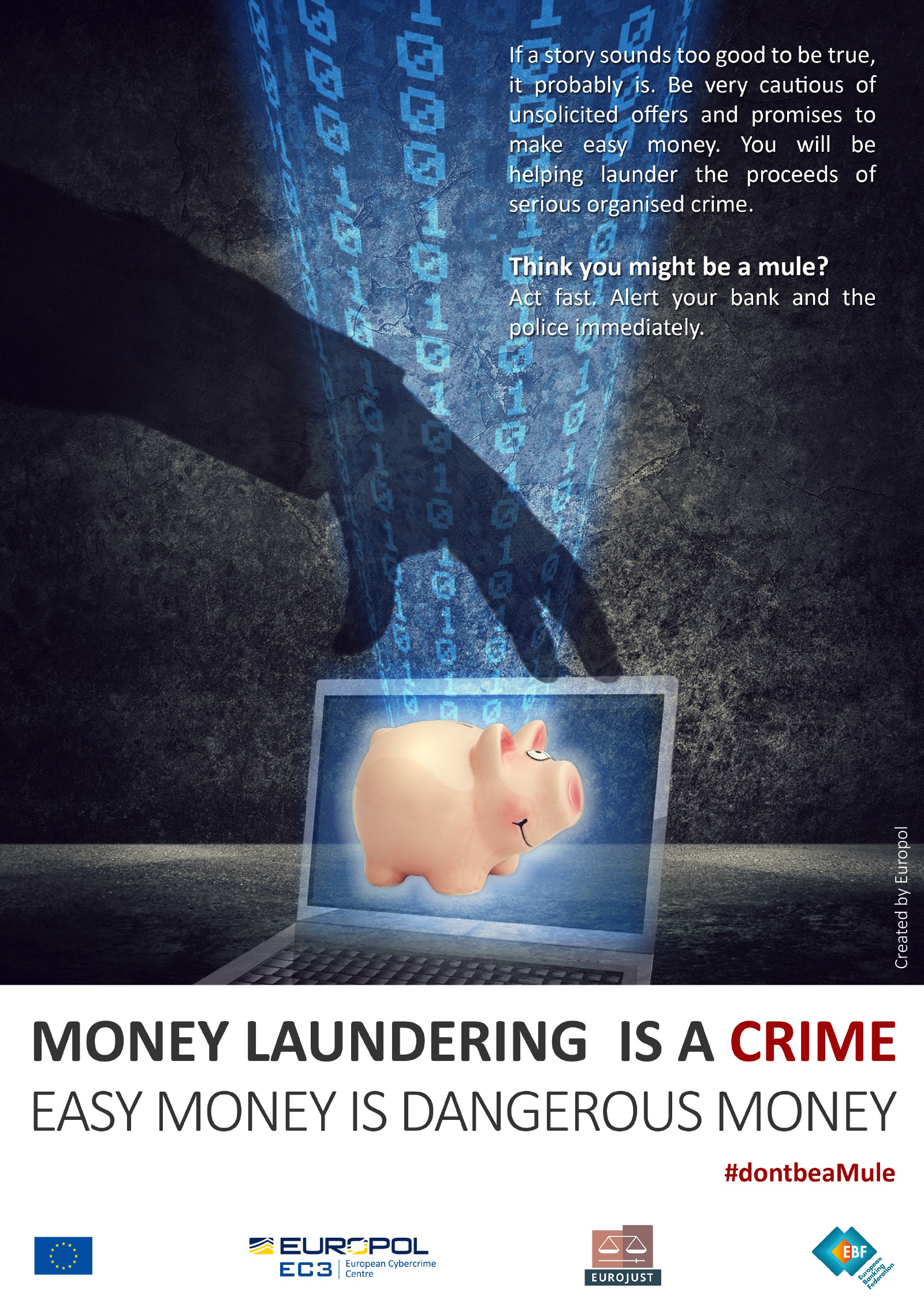
SCARS Institute’s Encyclopedia of Scams™ Published Continuously for 25 Years

Understanding and Protecting Yourself Against Money Mule Schemes
A SCARS Money Mule Series Guide
A Guide To Help You Avoid Becoming A Mule
Becoming A Money Mule Can Come With Consequences Far Beyond Money Loss!
Money Mules Are Used to Commit Fraud
“Money mules” are people who are used to transport and launder stolen money or some kind of merchandise.
Criminals may even recruit money mules to use stolen credit card information. Individuals being used as money mules may be willing participants; however, many money mules are not aware that they are being used to commit fraud. The individuals being used as money mules are not the only victims; the larger scheme is designed to extract money from an organization or from countless other people.
Schemes May Seem Like Legitimate Opportunities
The most common money mule solicitations are disguised as “work from home” opportunities. These advertisements often target unsuspecting people who are interested in the convenience and flexibility of these types of jobs. Because there are companies that legitimately offer opportunities to work from home, users may not recognize malicious offers. Criminals often try to make the offer seem as legitimate as possible and may use the following approaches:
- Carefully crafting the wording so that an email does not appear to be spam and is not caught by spam filters
- Linking to fake but professionally designed websites that appear to belong to recognized companies or that promote a company that does not even exist
- Posting some of these jobs on legitimate websites, including websites specifically for job seekers
Typical Money Mule Process
After an individual agrees to be a money mule, the schemes tend to follow a similar process:
- The “company” collects information from the “employee.” The information may include personal data such as the individual‟s Social Security number and bank account information. The company may also ask the employee to sign a seemingly official contract.
- The company (or the employee, under the direction of the company) creates a financial account 2 that the employee can use to collect and transfer funds.
- The employee receives funds or some type of merchandise.
- The employee is instructed to transfer the funds (usually keeping some percentage) to some other financial account or to deliver the merchandise to some third party.
This financial account or third party is associated with the criminal. Often, the company will instruct the employee to use wire transfers for the funds, and there may be another money mule on the other end of the transfer with instructions to cash those funds.
Through this process, the criminal receives the stolen money or merchandise while hiding his or her involvement.
Typically, a criminal will only use a money mule once. After the money mule performs his or her role in the transaction, the criminal usually dissolves the relationship completely and recruits someone else for the next scheme.
Consequences Can Be Severe
If caught and prosecuted, the criminal faces the most severe consequences. However, the other parties involved in the scheme may also face serious consequences.
Money Mule
The following are potential consequences for money mules: Inaccessible bank accounts – During an investigation, law enforcement officials may freeze a money mule‟s bank accounts. Being unable to access funds may create a significant financial burden. These activities may also have a long-term impact on credit scores.
- Prosecution – Money mules may be prosecuted for their participation in these schemes.
- Accountability for charges – In some cases, money mules are found personally responsible for repaying the losses suffered by the other victims.
- Vulnerability of personal information – As described in the typical process, criminals often collect personal information from the money mules. It is possible that the criminals may use this information for other malicious purposes.
Targeted Individuals
If the fraud is designed to extract money from individuals, those individuals could experience the following consequences: Financial loss – An individual may pay for undelivered goods or have money deducted directly from one of his or her financial or credit card accounts. Depending on the forum used for the transaction and whether the scheme is identified, the individual may be able to recover at least a portion of these losses. Significant hassle to resolve issues – Identifying and reporting the fraud may require numerous steps, and the process could take a long time.
Targeted Organizations
If the fraud is designed to extract money from an organization, it may affect both the organization and its customers or constituents.
- Financial loss – A criminal may be able to siphon significant amounts of money from an organization‟s financial accounts before the activity raises suspicions.
- Compromise of sensitive data – If a criminal can access customer data, such as credit card information, he or she may be able to steal that information and use money mules to abuse the customers‟ financial or credit card accounts.
- Damage to reputation – If an organization experiences fraud, they may lose the trust and loyalty of their customers or partners.
- Significant hassle to resolve issues – Identifying and reporting the fraud may require numerous steps, and the process could take a long time.
- Potential for future compromises – If a criminal uses malicious code to access information on an organization‟s computer, he or she may hide additional malicious code that would allow the criminal to regain access in the future. If an organization does not locate and remove this code, it may be susceptible to another compromise.
Take Steps to Protect Yourself
Be sure you read our 5 Steps Guide for Money Mules click here
Avoid Becoming a Money Mule
If an opportunity sounds too good to be true, it probably is. Look for common warning signs, and do some research before agreeing to participate. If you believe that you are participating in a money mule scheme, stop transferring money and merchandise immediately and notify the appropriate authorities. These authorities may include your bank, the service you used to conduct the transaction, and law enforcement.
Warning Signs
The following characteristics do not necessarily indicate a money mule solicitation, but they are commonly used in those solicitations. The position involves transferring money or goods.
- The specific job duties are not described.
- The company is located in another country.
- The position does not list education or experience requirements.
- All interactions and transactions will be done online.
- The offer promises significant earning potential for little effort.
- The writing is awkward and includes poor sentence structure.
- The email address associated with the offer uses a web-based service (Gmail, Yahoo!,
Windows Live Hotmail, etc.) instead of an organization-based domain.
Research Strategies Perform online searches using information from the offer:
- The subject line of the email
- The company supposedly offering the position
- The person who signed the message or the name of the contact person mentioned in the offer
Look for indications that the offer might be a scam.
- If an online search does not produce any results, that may also be suspicious.
- Check the Better Business Bureau website.
Avoid Becoming a Victim
Individuals and organizations can both take precautions that minimize their risks.
Individuals
- Try to investigate the person or company before doing business with them.
- When transferring money, use a method that protects the transaction. For example, many banks, credit cards, and services such as PayPal may offer fraud protection.
- Monitor the transactions, including checking for withdrawals from your bank account and tracking an order.
- If you notice any problems, immediately contact the appropriate authorities. Depending on the circumstances, these authorities may include your bank, the service you used to conduct the transaction, and law enforcement.
Organizations
Criminals typically use stealthy methods to access an organization‟s data or finances. These methods may include using malicious code, such as a virus, to gain administrative access to a computer within an organization or relying upon a malicious insider to transmit data or create fake customer accounts.
By implementing the following precautions and practices, organizations may reduce their risk:
- Use anti-virus and anti-spyware software, and keep the definitions up to date.
- Limit access to sensitive data to authorized personnel.
- Regularly check records, including employee lists and recent financial transactions.
- Look for new employees that Human Resources staff does not recognize, or for unauthorized transactions.
- Consider isolating the computers that perform banking and accounting functions. In small organizations, it may be feasible to use a separate laptop for these tasks. Larger organizations may be able to designate computers used to perform these tasks and apply stricter policies and access controls on those computers.
- Watch for suspicious behavior or activities from employees.
If you notice any problems, immediately contact the appropriate authorities. Depending on the circumstances, these authorities may include your IT department, your accounting department, and law enforcement.
PLEASE SHARE OUR ARTICLES WITH YOUR FRIENDS & FAMILY
HELP OTHERS STAY SAFE ONLINE – YOUR KNOWLEDGE CAN MAKE THE DIFFERENCE!
THE NEXT VICTIM MIGHT BE YOUR OWN FAMILY MEMBER OR BEST FRIEND!
By the SCARS™ Editorial Team
Society of Citizens Against Relationship Scams Inc.
A Worldwide Crime Victims Assistance & Crime Prevention Nonprofit Organization Headquartered In Miami Florida USA & Monterrey NL Mexico, with Partners In More Than 60 Countries
To Learn More, Volunteer, or Donate Visit: www.AgainstScams.org
Contact Us: Contact@AgainstScams.org
-/ 30 /-
What do you think about this?
Please share your thoughts in a comment below!
Table of Contents
- A Guide To Help You Avoid Becoming A Mule
- Money Mule
- Targeted Individuals
- Targeted Organizations
- Avoid Becoming a Money Mule
- Warning Signs
- Look for indications that the offer might be a scam.
- Avoid Becoming a Victim
- Did You Receive Money From A Scammer, Or Give A Scammer Access To Your Accounts?
- PLEASE SHARE OUR ARTICLES WITH YOUR FRIENDS & FAMILY
- By the SCARS™ Editorial Team
Society of Citizens Against Relationship Scams Inc. - The Issue Of Race In Scam Reporting
Click Here To Learn More!
LEAVE A COMMENT?
Recent Comments
On Other Articles
- Arwyn Lautenschlager on Love Bombing And How Romance Scam Victims Are Forced To Feel: “I was love bombed to the point that I would do just about anything for the scammer(s). I was told…” Feb 11, 14:24
- on Dani Daniels (Kira Lee Orsag): Another Scammer’s Favorite: “You provide a valuable service! I wish more people knew about it!” Feb 10, 15:05
- on Danielle Delaunay/Danielle Genevieve – Stolen Identity/Stolen Photos – Impersonation Victim UPDATED 2024: “We highly recommend that you simply turn away form the scam and scammers, and focus on the development of a…” Feb 4, 19:47
- on The Art Of Deception: The Fundamental Principals Of Successful Deceptions – 2024: “I experienced many of the deceptive tactics that romance scammers use. I was told various stories of hardship and why…” Feb 4, 15:27
- on Danielle Delaunay/Danielle Genevieve – Stolen Identity/Stolen Photos – Impersonation Victim UPDATED 2024: “Yes, I’m in that exact situation also. “Danielle” has seriously scammed me for 3 years now. “She” (he) doesn’t know…” Feb 4, 14:58
- on An Essay on Justice and Money Recovery – 2026: “you are so right I accidentally clicked on online justice I signed an agreement for 12k upfront but cd only…” Feb 3, 08:16
- on The SCARS Institute Top 50 Celebrity Impersonation Scams – 2025: “Quora has had visits from scammers pretending to be Keanu Reeves and Paul McCartney in 2025 and 2026.” Jan 27, 17:45
- on Scam Victims Should Limit Their Exposure To Scam News & Scammer Photos: “I used to look at scammers photos all the time; however, I don’t feel the need to do it anymore.…” Jan 26, 23:19
- on After A Scam, No One Can Tell You How You Will React: “This article was very informative, my scams happened 5 years ago; however, l do remember several of those emotions and/or…” Jan 23, 17:17
- on Situational Awareness and How Trauma Makes Scam Victims Less Safe – 2024: “I need to be more observant and I am practicing situational awareness. I’m saving this article to remind me of…” Jan 21, 22:55
ARTICLE META
Important Information for New Scam Victims
- Please visit www.ScamVictimsSupport.org – a SCARS Website for New Scam Victims & Sextortion Victims
- Enroll in FREE SCARS Scam Survivor’s School now at www.SCARSeducation.org
- Please visit www.ScamPsychology.org – to more fully understand the psychological concepts involved in scams and scam victim recovery
If you are looking for local trauma counselors please visit counseling.AgainstScams.org or join SCARS for our counseling/therapy benefit: membership.AgainstScams.org
If you need to speak with someone now, you can dial 988 or find phone numbers for crisis hotlines all around the world here: www.opencounseling.com/suicide-hotlines
A Note About Labeling!
We often use the term ‘scam victim’ in our articles, but this is a convenience to help those searching for information in search engines like Google. It is just a convenience and has no deeper meaning. If you have come through such an experience, YOU are a Survivor! It was not your fault. You are not alone! Axios!
A Question of Trust
At the SCARS Institute, we invite you to do your own research on the topics we speak about and publish, Our team investigates the subject being discussed, especially when it comes to understanding the scam victims-survivors experience. You can do Google searches but in many cases, you will have to wade through scientific papers and studies. However, remember that biases and perspectives matter and influence the outcome. Regardless, we encourage you to explore these topics as thoroughly as you can for your own awareness.
Statement About Victim Blaming
SCARS Institute articles examine different aspects of the scam victim experience, as well as those who may have been secondary victims. This work focuses on understanding victimization through the science of victimology, including common psychological and behavioral responses. The purpose is to help victims and survivors understand why these crimes occurred, reduce shame and self-blame, strengthen recovery programs and victim opportunities, and lower the risk of future victimization.
At times, these discussions may sound uncomfortable, overwhelming, or may be mistaken for blame. They are not. Scam victims are never blamed. Our goal is to explain the mechanisms of deception and the human responses that scammers exploit, and the processes that occur after the scam ends, so victims can better understand what happened to them and why it felt convincing at the time, and what the path looks like going forward.
Articles that address the psychology, neurology, physiology, and other characteristics of scams and the victim experience recognize that all people share cognitive and emotional traits that can be manipulated under the right conditions. These characteristics are not flaws. They are normal human functions that criminals deliberately exploit. Victims typically have little awareness of these mechanisms while a scam is unfolding and a very limited ability to control them. Awareness often comes only after the harm has occurred.
By explaining these processes, these articles help victims make sense of their experiences, understand common post-scam reactions, and identify ways to protect themselves moving forward. This knowledge supports recovery by replacing confusion and self-blame with clarity, context, and self-compassion.
Additional educational material on these topics is available at ScamPsychology.org – ScamsNOW.com and other SCARS Institute websites.
Psychology Disclaimer:
All articles about psychology and the human brain on this website are for information & education only
The information provided in this article is intended for educational and self-help purposes only and should not be construed as a substitute for professional therapy or counseling.
While any self-help techniques outlined herein may be beneficial for scam victims seeking to recover from their experience and move towards recovery, it is important to consult with a qualified mental health professional before initiating any course of action. Each individual’s experience and needs are unique, and what works for one person may not be suitable for another.
Additionally, any approach may not be appropriate for individuals with certain pre-existing mental health conditions or trauma histories. It is advisable to seek guidance from a licensed therapist or counselor who can provide personalized support, guidance, and treatment tailored to your specific needs.
If you are experiencing significant distress or emotional difficulties related to a scam or other traumatic event, please consult your doctor or mental health provider for appropriate care and support.
Also read our SCARS Institute Statement about Professional Care for Scam Victims – click here to go to our ScamsNOW.com website.



























Thank you for your comment. You may receive an email to follow up. We never share your data with marketers.